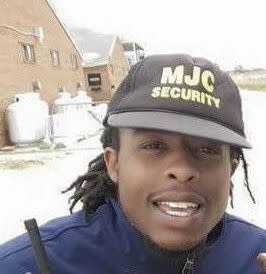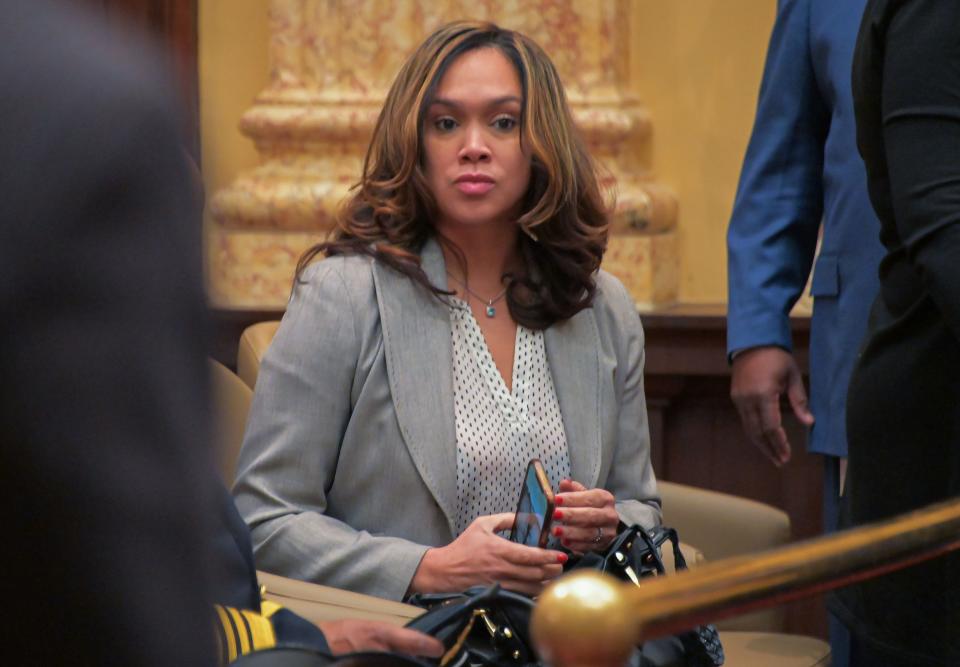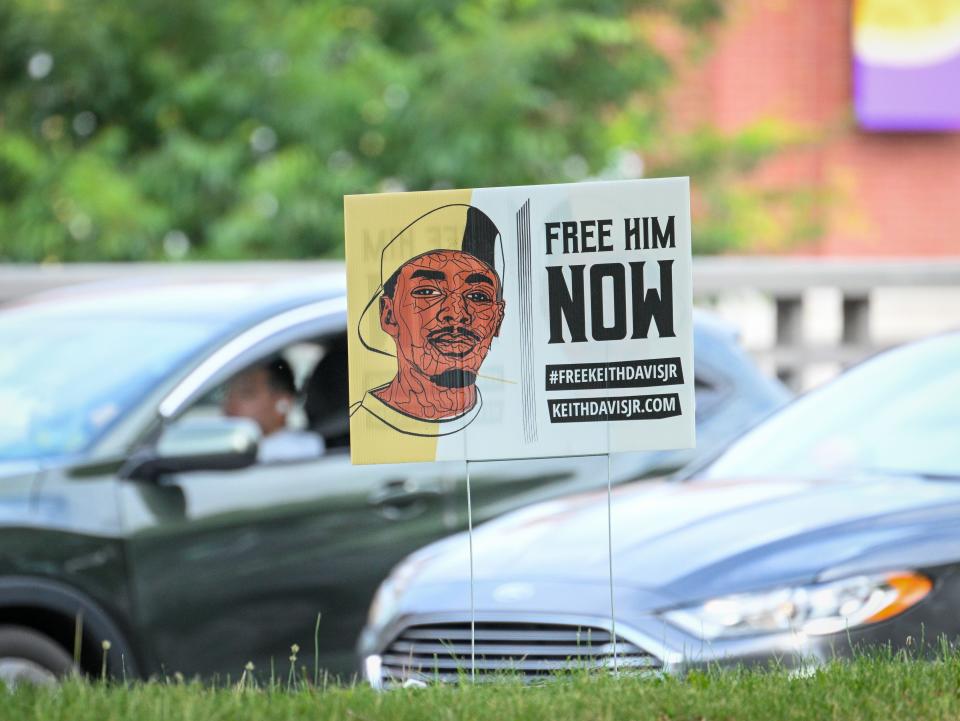Baltimore judge finds ‘presumption of vindictiveness’ in Keith Davis Jr. attempted murder case, sets evidence hearing
- Oops!Something went wrong.Please try again later.
Finding that Baltimore State’s Attorney Marilyn Mosby and her staff showed “personal animosity” toward Keith Davis Jr., a city judge ruled there was a “presumption of vindictiveness” behind prosecutors’ decision to charge Davis with attempted murder shortly after he won a fifth trial in a controversial 2015 murder case.
Circuit Judge John Nugent stopped short of saying Mosby’s office was vindictive in bringing the charges against Davis — and of dismissing the charges on those grounds — but said the defense presented enough evidence of the possibility of vindictiveness to warrant Mosby’s office turn over relevant records and to hold an evidentiary hearing.
“While the state’s attorney’s office has vigorously defended its prosecutorial decisions, the record demonstrates a history of antagonism towards Mr. Davis and his supporters,” Nugent wrote.
Nugent said there was no presumption of vindictiveness underlying the separate homicide case involving Davis, which stems from the fatal shooting of Pimlico Race Course security guard Kevin Jones. The judge denied the defense’s request to dismiss those charges.
Still, a ruling like Nugent’s is exceedingly rare in the courts because it goes to the heart of a prosecutor’s discretion, which goes virtually unchecked in the criminal justice system, according to legal experts.
“I can’t say there’s never been a finding in this pretrial context, but it may be the first time in Maryland history,” said David Jaros, faculty director of the University of Baltimore School of Law’s Center for Criminal Justice Reform.
“The courts are extremely reluctant to second-guess or oversee the discretionary decision of prosecutors on charging,” he said. “Only with pretty exceptional facts would courts step in and create this presumption of vindictiveness.”
Wanda Keyes Heard, retired chief judge of the Baltimore Circuit Court, was on the bench for 21 years and said she “tried a lot of cases.”
”I never found a presumption of vindictiveness met by the defense in order for an evidentiary hearing to be held, because that is a very high standard and it would mean there were a certain series of facts that meant the defense met its burden,” Heard said.
Zy Richardson, a spokeswoman for the state’s attorney’s office, declined to comment, citing a gag order in place in the case.
Mosby’s office charged Davis with attempted murder almost a year after an alleged jailhouse fight and less than two weeks after he won another murder trial in the Jones case. An office spokesperson said at the time that prosecutors were waiting to see if Davis’ conviction was reversed before bringing the unrelated charges.
Davis’ four other murder trials went like this: His first, in 2017, resulted in a hung jury. After his second trial the same year ended with a conviction, a judge threw it out, finding prosecutors had withheld information from the defense. A jury deadlocked in his third murder trial. His fourth, in 2019, resulted in a guilty verdict that later was reversed.
The timing of the attempted murder charge and the office’s publicly stated reasoning were among several reasons Nugent outlined in reaching his decision that there was a presumption of vindictiveness.
Nugent determined Mosby’s office “continually refused to recognize Mr. Davis’ presumption of innocence in public even though he had been granted new trials vacating his prior convictions,” the judge wrote, referencing the prosecutor’s office repeatedly calling Davis a “repeat violent offender.”
The homicide prosecutor assigned to Davis’ case at the time acted outside the “normal protocols followed” when assaults occur in Maryland correction facilities, Nugent wrote. While that prosecutor originally instructed the Department of Public Safety and Corrections to withhold charges, he reversed course in a meeting with correctional intelligence officials six days after Davis won the new murder trial in 2019.
Davis was being held without bond at the Maryland Reception, Diagnostic and Classification Center in Baltimore at the time of the alleged fight.
“If one were to lay the state’s prosecution of the MRDCC incident overtop of any similar set of facts in other cases, it would result in a presumption of vindictiveness every time,” wrote Nugent, referring to one of the legal criteria necessary to establish the presumption.
Nugent’s ruling shifts the burden to Mosby’s prosecutors to prove the office was not vindictive in bringing the attempted murder charges against Davis.
At a hearing earlier this month where the lawyers sparred over the claims of vindictiveness, Assistant State’s Attorney Rita Wisthoff-Ito said the coronavirus pandemic impacted the timing of the charges in the alleged jail fight. She added that prosecutors regularly meet with investigators to go over charging decisions and she defended the choice to wait to file charges until the conviction was reversed.
“If it was going to overturn the conviction, in the interest of public safety, because it was a serious knife assault, they were going to charge the attempted murder,” Wisthoff-Ito told Nugent.
Nugent’s order regarding vindictiveness comes about a week after he issued another significant ruling in the case. He ordered Mosby last week to appear in court to defend herself against allegations she violated the gag order when she appeared on a radio show and discussed Davis’ case within an hour of the judge’s ruling going into effect.
The judge had sought to subdue public discourse surrounding the case by prohibiting attorneys involved from making comments outside court “intended to influence public opinion regarding the merits of the cases.”
Following Mosby’s segment on WYPR-FM in Baltimore, Davis’ lawyers swiftly alleged she violated Nugent’s order. Mosby will have to attend an Aug. 12 hearing to explain why she should not be held in contempt of court.
The recent legal battle brings renewed tension to Davis’ saga. Mosby has faced persistent calls from Davis’ supporters to free him rather than continue to retry him, but has maintained her office is motivated by seeking justice for Jones’ family. Her frustrations have boiled over in several public confrontations.
The murder charges against Davis came seven days after he was largely absolved in an armed robbery case, allegations that stemmed from an incident the same day as the fatal shooting. Suspecting Davis of robbing an unlicensed cabdriver and alleging he was armed, police chased him into an auto garage and fired 32 rounds at him, striking him three times. Police said they found a handgun in the garage.
At a trial on armed robbery charges, a jury acquitted Davis on every count save being a prohibited person in possession of a firearm. Police and prosecutors say the handgun was used to shoot Jones, though the testimony of the firearms examiners who claimed the ballistics matched has been criticized.



